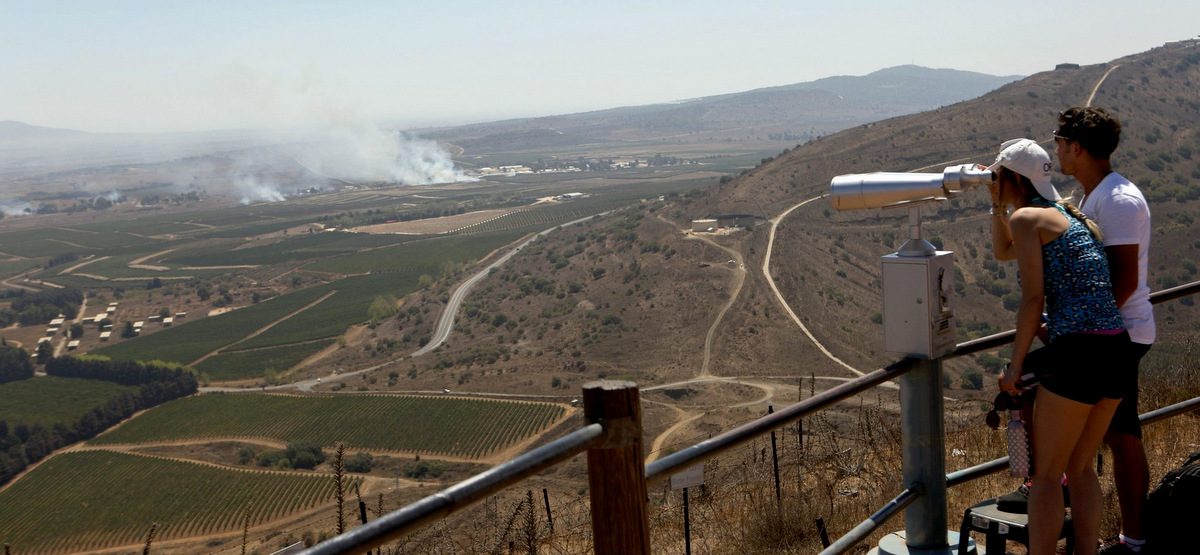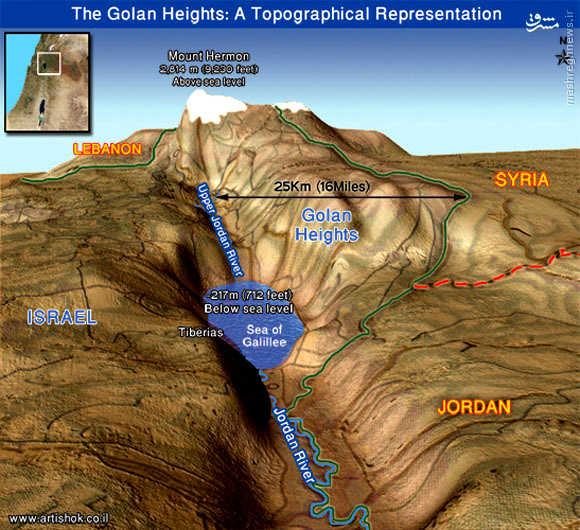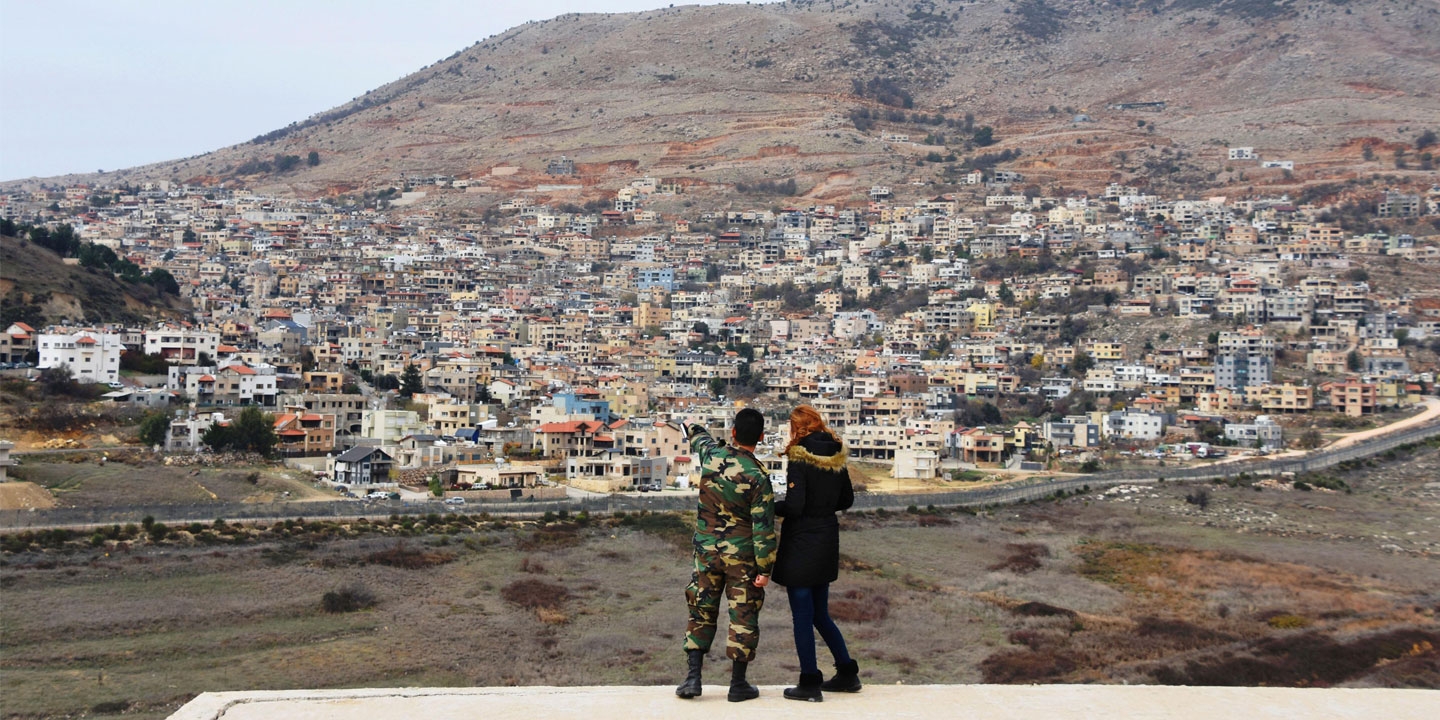GOLAN HEIGHTS – Soon after Saturday’s dangerous escalation involving Syria’s downing of an Israeli fighter jet in its airspace seemed to fizzle out, the Jerusalem Post reported that Israel was approaching the de-escalation period as a time to prepare for large-scale war with its northern neighbor by boosting its air defenses. According to those cited by the Post, convoys of missile-defense batteries have been relocated to the Israeli-Arab city of Baka al-Gharbiya and numerous other batteries have been sighted on highways throughout northern Israel.
While the deployment of air defenses to the country’s north seems to forebode an imminent conflict, some experts, like Ofer Zalzberg of the International Crisis Group think tank, have asserted that the recent escalation between Syria and Israel will remain contained, despite Israel’s apparent preparations for a large-scale conflict. “I think this incident is more likely to be contained because fundamentally it is a gradual attempt to renegotiate the so-called rules of the game,” Zalzberg told AFP, further suggesting that Russia should mediate in order to prevent the weekend’s events from sparking a regional war. Russia, for its part, seemed eager to halt the hostilities, as it urged the need to “avoid any measure that could lead to a dangerous escalation.”
Indeed, any escalation that would lead to a state of open conflict between Syria and Israel would surely spread, quickly involving Syrian allies including Iran and Lebanon’s Hezbollah and, potentially, more powerful nations like the United States and Russia.
Even if recent events fail to translate into a war between Israel and its northern neighbors, any attempts to prevent such a war – no matter how “successful” they may seem – will only be temporary at best. Israel, even prior to its establishment as a state in 1948, has been ever eager to annex southern Syria in order to gain access to key resources – first, fresh water and now, oil. It is this same desire that continues to motivate Israel’s aggression against its neighbors.
As Syria will not relinquish what is theirs as long as their sovereignty remains intact, Israel has sought to take such prizes through a variety of tactics ranging from illegal occupation to fomenting covert regime-change efforts. As those efforts have continued to fail, Israel has grown more and more desperate to lay claim to those resources that lie just beyond its reach. Unless Israel relinquishes its desire for its neighbor’s resources, the next war is inevitable.
The Golan: Israeli goal in pushing Syria to war

Israeli tourists watch smoke rising near the Syrian border of the occupied Golan Heights as the Syrian army fights to regain control of the Quneitra border crossing from rebel groups, thought to be covertly supported by the Israeli government. (Atef Safadi/EPA)
Though casual observers of the Syrian conflict may find the weekend’s events as having come out of nowhere, those who have closely followed the conflict and appreciate the context will note that Israel seems to have finally gotten the war with Syria it has long sought.
However, Israel is not hungry for war in and of itself. Instead, it is eager to cement its claim to the Golan Heights, a plateau bordering Israel, Lebanon and Syria. In order to accomplish that, regime change in Syria is essential, as the international community still refuses to recognize Israel’s seizure and continued occupation of the Golan as legal. This bars Israel from commercially developing the area’s rich resources, which are key to understanding Israel’s willingness to go to war over a seemingly small and insignificant tract of land. However, a new Syrian government, one more “friendly” to Israeli interests, could officially relinquish Syria’s claim to the Golan, paving the way for the complete and official annexation of the territory by Israel.
Though measuring no more than roughly 460 square miles, the Golan is of great strategic importance for several reasons. The most commonly cited by Israeli media is that it offers a bulwark against northern “hostile” nations due to its rugged geography, helping Israel to “defend” against incoming attacks from either Syria or Lebanon.

A topographical representation of the Golan Heights, including it’s precious water resources centering around the Sea of Galilee. (Graphic courtesy of Mashregh News)
However, much more important to Israel’s “national security” than the oft-stated “barrier” advantage is the fact that the Golan Heights houses significant fresh-water resources. Under occupation, the Golan is one of three sources of fresh water to the Israeli state — and is the largest in size and most plentiful, as it comprises the mountain streams that feed Lake Kinneret (the Sea of Galilee) and the headwaters of the Jordan river. Currently, over a third of all the fresh water made available to Israelis originates in the Golan Heights.
Though fresh water is an especially important resource in the Middle East, it is now more important to Israel than ever before. Israel is in its fourth year of a drought so massive that a NASA study called it the worst drought in the region in nearly 900 years. As a result, the water in the Golan Heights is essential to Israel and its attempts to expand.
This resource was a major motivating factor in Israel’s 1967 takeover and subsequent 1981 annexation of the Golan Heights. During that period, Israel expelled nearly all of the area’s original inhabitants and demolished their villages. As Israeli newspaper Haaretz reported in 2010, more than 100,000 Syrians lost their homes and property as a result of the occupation. Israel has no intention of letting the Golan’s original inhabitants return, however. The area is currently home to some 20,000 settlers and a plan is currently underway to settle 100,000 more in the next several years in order to strengthen Israel’s claim to the area.
Though the abundant fresh water in the Golan Heights is of crucial importance to Israel, the Golan’s value grew sharply following the discovery of a major oil reserve in the area, estimated to contain “billions of barrels” of crude oil that could turn Israel – which currently imports the vast majority of its fuel – into a net oil exporter. Yet, because the Golan Heights are internationally recognized as being under occupation and not an official part of Israel, the commercial extraction and export of this vast oil reserve cannot go forward — until this status changes. As a result, only exploratory wells have been drilled, mostly by a division of Genie Energy Co., a U.S.-based oil company connected to well-known figures such as Rupert Murdoch, Jacob Rothschild, and Dick Cheney.
The Golan and the genesis of the Syrian conflict

A Syrian military spokesperson (L) points to the Israeli-occupied Golan Heights on Dec. 23, 2017, in Al Gunaytirah in southwestern Syria. (Kyodo via AP Images)
The desire to claim the Golan Heights and all of its resources under internationally recognized circumstances is also, in part, to blame for Israel’s key role in the genesis of the current violence in Syria.
Five years before the current conflict in Syria began, the government of Israel hatched a plan to overthrow Syrian President Bashar al-Assad by creating sectarian strife in the country and isolating Syria from its strongest regional ally, Iran. As mentioned, the Assad-led government has refused to recognize Israel’s hold on the Golan and has vowed to retake it as part of Syria.
Read more by Whitney Webb
- Lifting of US Propaganda Ban Gives New Meaning to Old Song
- How “America First” Became the Presidency of the Pentagon
- Trump’s Drone Kill Rate 80 Times Greater than Under Bush
- Palantir: The PayPal-offshoot Becomes a Weapon in the War Against Whistleblowers and WikiLeaks
The plan was never designed to be enacted by Israel but instead by its “staunch ally” the United States. The U.S. adopted the plan and the communications of former Secretary of State Hillary Clinton revealed that this plan was a major factor in U.S. policy leading up to the genesis of the Syrian conflict. One of her leaked emails, published by WikiLeaks, stated that “the best way to help Israel deal with Iran’s growing nuclear capability is to help the people of Syria overthrow the regime of Bashar Assad.”
That same email also noted that “a successful intervention in Syria would require substantial diplomatic and military leadership from the United States.” It also added that “arming the Syrian rebels and using Western air power to ground Syrian helicopters and airplanes is a low-cost high-payoff approach.”
Unsurprisingly, official recognition of Israel’s annexation of the Golan was prominent among the regime-change promises touted by the Syrian “rebels.” Throughout the now seven-year-long war, rebels have offered to “trade” or sell the Golan to Israel in exchange for military aid or an Israeli-imposed “no-fly zone” in their bid to overthrow Assad.
The match is lit

Debris is scattered from a downed Israeli F-16 which was shot down by Syria following an Israeli incursion into Syrian airspace. The jet was downed near Harduf, in northern Israel, Saturday, Feb. 10, 2018. (Reuters)
Despite Israel and U.S.’ best efforts, the“low-cost high-payoff approach” has not gone as planned. Instead, Assad has managed to consolidate large parts of Syrian territory once lost to the “rebels,” the bulk of which are terrorist groups or their affiliates. As its past efforts and more recent plans to annex southern Syria through regime change have failed, Israel has grown more desperate, as evidenced by everything from the “dozens and dozens” of attacks it has launched against Syria to last year’s threats to assassinate Assad by bombing his residence. Experts have long noted that these are attempts to provoke Syria into a conflict.
In addition to these provocations, Israel has been creeping further into southern Syria under the guise of establishing a “safe-zone” or buffer region that extends from the Golan into the southern Syrian provinces of Quneitra and Daraa. According to Syrian opposition sources and Israeli-American NGOs, this safe zone is “intended to keep the Syrian army and its Iranian and Lebanese allies as far away from Israel’s border as possible, as well as solidify Israel’s control over the occupied Golan Heights.”
Alongside the buffer zone’s expansion, Israel has “offered” to occupy Syrian villages to “protect” them from the very Syrian rebels that Israel has been funding, arming, and offering medical treatment to throughout the conflict — even though most are allied with al-Nusra Front (Al Qaeda) or Daesh (ISIS).
While Israel has, for much of the war, been conducting these attacks against, and illegal incursions into, Syria with impunity, all of that has now changed due to this past weekend’s events. Now that Syria is responding to flagrant violations of its sovereignty, Israel knows the match is lit and, by all indications, are preparing for what comes next.
Top Photo | An Israeli soldier directs a tank near the border with Syria in the Israeli-occupied Golan Heights,
Nov. 28, 2016. (AP/Ariel Schalit)
Whitney Webb is a staff writer for MintPress News who has written for several news organizations in both English and Spanish; her stories have been featured on ZeroHedge, the Anti-Media, and 21st Century Wire among others. She currently lives in Southern Chile.
The post Israel Preps for Syrian War with Golan’s Oil and Water in its Sights appeared first on MintPress News.
